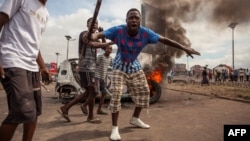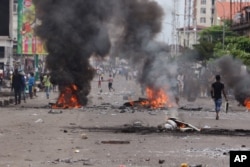Congo's government vowed on Wednesday to hunt down and punish those responsible for riots in which around three dozen people were killed, as small pockets of protest continued in the capital Kinshasa.
Anti-government protesters gathered in parts of Kinshasa on Wednesday, but normal life resumed in most of the capital after two days of deadly riots, residents and witnesses said. The army was dispatched to parts of the city where tensions persisted.
"We are no longer in a warning stage ... we will punish the infractions committed," attorney general Flory Kabange Numbi told reporters in Kinshasa, adding that migration officials would prevent those responsible from leaving the country.
"The Congolese national police are actively seeking out the ... authors of these grave acts of murder and plunder," he added.
Congo has for months suffered simmering anger over what opponents of President Joseph Kabila believe are his efforts to hold on to power beyond his constitutional term limit, either by delaying elections or changing the constitution, as other African leaders have done.
The protests on Monday escalated into violent clashes between demonstrators and police, leaving at least 37 protesters and six policemen dead, Human Rights Watch said.
Police spokesman Pierre Rombaut Mwanamputu told a news conference on Wednesday that the official death toll was 32, of whom four were police.
But opposition leader Etienne Tshisekedi said on Belgian television that around 100 people had died.
On Wednesday morning, angry youths burned tires in one district as police fired warning shots, a resident said, and the army sent trucks carrying around 50 troops to a university campus to prevent any further demonstration.
Kabila is ineligible to stand in the next election after serving two elected terms. Last week, the election commission petitioned the Constitutional Court to postpone the November poll. His supporters deny he is trying to prolong his rule.
World powers have become increasingly exasperated with Kabila's administration. French President Francois Hollande has said the clashes were caused "by the Congolese state itself," and urged authorities to respect the constitution and hold elections on schedule.
Tom Perriello, U.S. Special Envoy for Africa's Great Lakes region, warned on Tuesday the United States was "ready to impose additional targeted sanctions on individuals who have been involved in abuses or violence."
The U.S. government imposed sanctions on a senior police official in the Democratic Republic of Congo in June for his role in what it described as the violent suppression of the opposition.
A senior adviser to Kabila who last week conducted what he called a "pleading mission" to the United States to press officials not to impose further sanctions, told reporters in New York on Tuesday that a national political dialogue to solve the stand-off would continue.
"It is our hope that a consensus can be reached soon to set a date for [the] elections," Barnabe Kikaya said.






